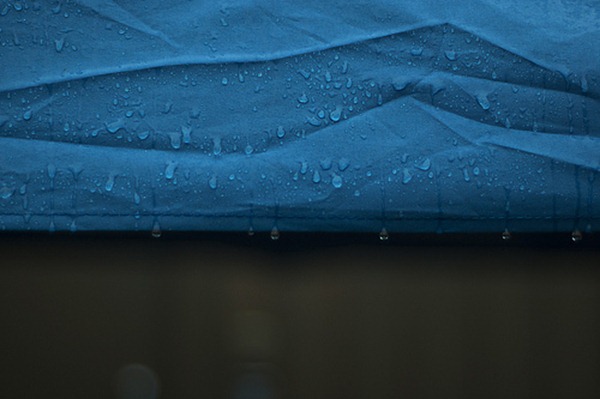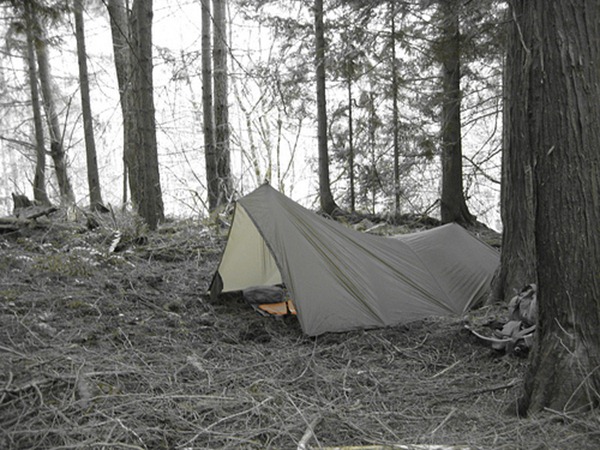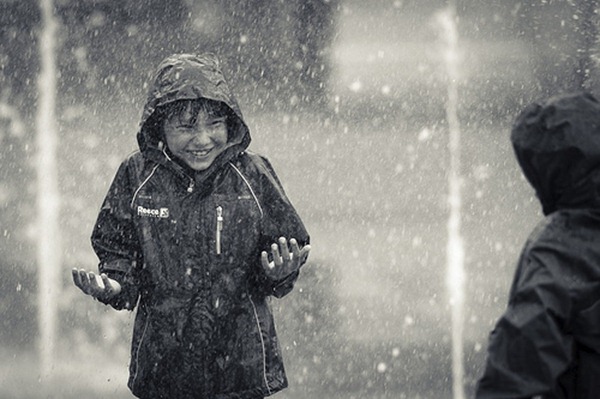Have you ever camped in the rain? And I don’t mean a sun shower.
I mean rain, that doesn't ease up.

Important disclaimer before you read further: I do like rain on
Now this might seem like a blooming obvious thing to say.
But if you do have an option to cancel, do it. If your camping trip
But ask yourself this – would you much rather have the kids upset
There will always be another time.
Location Location Location
So even if its sunny when you arrive, think about what its going
We camped in pouring rain, and as it ran off the annexe, it was

If space allows, bringing an extra shelter (apart from where you are
It does not need to be a massive pop up shelter either. A tarp can
If you have children – this might just save your sanity.

Appropriate Gear

Bring wet weather gear. That means waterproof jackets with hoods
(or at least water-resistant). Umbrellas can work in the right situation,
but not ideal especially if you are moving around the campsite and
need hands to be free.Cotton clothing is really useless in rain.
It gets wet and stays wet. Whilst it can be great on a warm day, for rainy
weather, its bad news. See more on why cotton and rainy weather are
not best friends, inthis article about why cotton kills.Dress appropriately,
with layering is the best option.And if camping in the rain, seems to
happen a bit to you, then do invest in the best wet weather gear you
can afford.
When it comes to camping and hiking gear, you do get what you pay for.
For children, sometimes a rain poncho works well. And good Wellington
boots or any shoes that are are waterproof. Wet socks for little one
(and big ones, is miserable). Pack extra!
Bags and more bags
Keeping your “stuff” dry is paramount.
Don’t let wet gear into your sleeping area, because that is an area you
All equipment especially cameras/phones should be in dry sacks when
Lack of ventilation in your sleeping area, will mean condensation
But just don’t try to cook inside your tent – ever.
And there are lots of articles on how to start a fire in the
Hopefully some of these tips will help make your next rain-filled camping
And if you do hang in there, and not head home because of the rain, don't
Good or bad experience?

Generally, most people will say its far from ideal, and many just pack up and
head home early. And if that is possible, then do it. Because its not fun.
Sometimes, ending a holiday is not possible, and you are going to have to
just deal with it.
Important disclaimer before you read further: I do like rain on
the tent at night. It’s a great sound to hear when you are warm
and dry. So a little rain, is not going to kill you, and doesn't mean
a ruined holiday. Stay calm and keep camping.
So, here are some tips for camping in the rain (ie. not sun shower)
So, here are some tips for camping in the rain (ie. not sun shower)
And add yours in the comment section too.
Don’t go
Don’t go
Now this might seem like a blooming obvious thing to say.
But if you do have an option to cancel, do it. If your camping trip
is just a weekend away, not planned with military precision, you
might find that staying home could be better way to spend
your weekend.
Yes, it can be disheartening that planning and preparation is
put on hold. Yes, the kids might whinge and moan at the plans
being thwarted.
But ask yourself this – would you much rather have the kids upset
at home (and with lots of distractions and options available) or
have them miserable and trapped in a tent/caravan with you
for 2 days?
There will always be another time.
Location Location Location
Think about where you set up each and every camp trip.
So even if its sunny when you arrive, think about what its going
to be like should it rain. Where will the water run? When it runs
off your accommodation, will it run away from the tent, or pool in
the indentation where you set up?
We camped in pouring rain, and as it ran off the annexe, it was
running straight to the tent entrance (in a dip). Our son ran out
in the rain, and dug trenches away from the tent (which he still
talks about today!).
Extra shelter

If space allows, bringing an extra shelter (apart from where you are
sleeping) is VERY helpful. You can use it as a space to wait out the
rain and not be trapped indoors. It can provide protection for other
camping gear, plus provide an area to cook and eat in (because
you should avoid having food in your tent). And if there is a leak
in your accommodation, you can always use this tarp/extra shelter,
to provide much needed protection.
It does not need to be a massive pop up shelter either. A tarp can
do a great job. The site Camping with Charlie has some good ideas
on ways to set up. And important point, a shelter, provides an
opportunity to set up a clothes line to dry off wet clothes.
If you have children – this might just save your sanity.

Appropriate Gear

Bring wet weather gear. That means waterproof jackets with hoods
(or at least water-resistant). Umbrellas can work in the right situation,
but not ideal especially if you are moving around the campsite and
need hands to be free.Cotton clothing is really useless in rain.
It gets wet and stays wet. Whilst it can be great on a warm day, for rainy
weather, its bad news. See more on why cotton and rainy weather are
not best friends, inthis article about why cotton kills.Dress appropriately,
with layering is the best option.And if camping in the rain, seems to
happen a bit to you, then do invest in the best wet weather gear you
can afford.
When it comes to camping and hiking gear, you do get what you pay for.
For children, sometimes a rain poncho works well. And good Wellington
boots or any shoes that are are waterproof. Wet socks for little one
(and big ones, is miserable). Pack extra!
Bags and more bags
Keeping your “stuff” dry is paramount.
Don’t let wet gear into your sleeping area, because that is an area you
need to remain pristine. All wet gear stays outside, and store it a
plastic bag to keep it touching anything else. Dry sacks are
great for keeping wet and dry, apart.
Ensure all clean clothes
(and dry) stay in a bag that won’t let water in. Use a garbage
bag if really necessary.
All equipment especially cameras/phones should be in dry sacks when
not in use. Water getting into them can be fatal to them.
In your tent at night, keep them in waterproof bags too–if the
accommodation lacks adequate ventilation, condensation can build up on them.
Lack of ventilation in your sleeping area, will mean condensation
that makes everything damp. Avoid letting bedding touch the
walls of the tent.
Cooking
The meal on the campfire might have to wait due to rain. Bring at
The meal on the campfire might have to wait due to rain. Bring at
least one backup meal that doesn’t require a roaring fire.
Pasta and a bottled sauce is a good one to have in the supply box.
But just don’t try to cook inside your tent – ever.
A good campfire stove is recommended for those times when a
campfire is not an option. We have a variety, but the Trangia is very
multi-functional stove and is lightweight and portable too. Just ensure
if you are cooking under your tarp/shelter, that there is a large
distance between the stove and the shelter.
And there are lots of articles on how to start a fire in the
rain – but for me, it all sounds too hard when camping is meant
to be fun. If you are into Man Vs. Wild style of camping, then
read up on how to do it.
Hopefully some of these tips will help make your next rain-filled camping
adventure a little easier to cope with.
And if you do hang in there, and not head home because of the rain, don't
let a bad experience colour your opinions on camping. It's all these little,
not-so-perfect moments, that can make your life one big adventure.
So, what do you think about camping in the rain?
